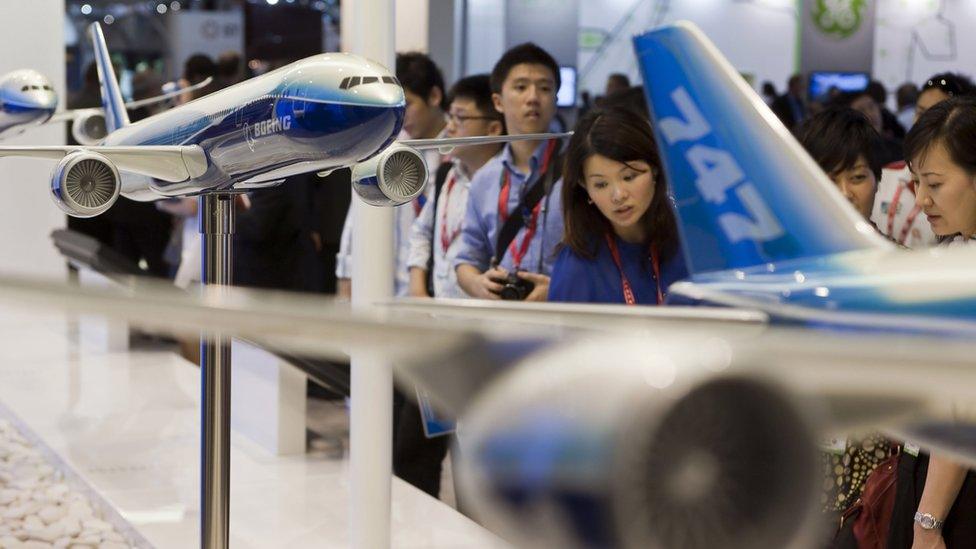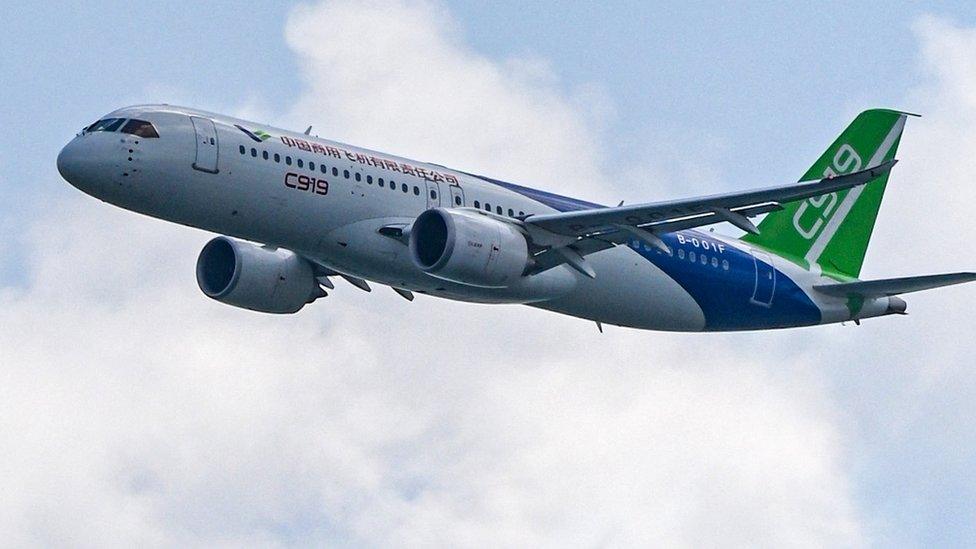Boeing: Aviation giant displays crisis management at Asia's top airshow
- Published

Visitors at the Singapore Airshow look at model Boeing airliners
As the aviation industry gathers this week for the Singapore Airshow there is no shortage of military hardware made by US aerospace giant Boeing.
Spectators have been treated to displays by the F-15 fighter and Apache attack helicopter. However, conspicuously absent from the event are Boeing's commercial jets.
Instead, attendees of Asia's biggest airshow have to make do with models of Boeing's passenger planes or can step inside an "immersive display" of the Boeing 777X cabin.
And as the event was in full-swing, Boeing announced that the leader of the troubled 737 Max programme Ed Clark would leave the company.
It's Boeing's first major aviation event since a cabin panel detached mid-flight from a brand new Alaska Airlines Boeing 737 Max 9 in January.
In a preliminary investigation of the Alaska Airlines incident, US regulators found four critical bolts - meant to hold the so-called door plug in place - were missing. It led the Federal Aviation Administration (FAA) to order a temporary global grounding of the aircraft.
The planes are now flying again but the FAA said it will not yet allow Boeing to expand production of its best-selling narrow body family of jets, which includes the 737 Max 9.
In contrast, Boeing's arch-rival Airbus took to Singapore's skies with its A350-1000 passenger jet.
In its latest earnings report, external, the European aerospace giant said it would deliver 800 planes this year, including its A320neo which is a competitor to Boeing's 737 Max. Since the Alaska Airline incident, Boeing orders have shrunk significantly, delivering just 27 planes in January, compared to 67 in December.
Watch: 'Trip from hell': On board flight during mid-air blowout
Safety first
After the National Transportation Safety Board's (NTSB) preliminary investigation into the the Alaska Airlines incident , Boeing's president, external Dave Calhoun said, "whatever final conclusions are reached, Boeing is accountable for what happened."
"There is no message or slogan to do that. It will take transparency and demonstrated action - that starts with each of us along with a commitment to listening to each other and speaking up," he added.
At the Singapore Airshow, Boeing marketing executive Dave Schulte said the plane was "by far the most scrutinised" and "safest" in the world, adding that he had flown on one with his family the previous week.
Some of Boeing's biggest customers have voiced their frustrations with the company, with the boss of Emirates airline warning that Boeing is in the "last chance saloon" after a "progressive decline" in its performance.
This is not the first time Boeing has faced a safety crisis. In 2018, the 737 Max 8 was grounded after two fatal crashes off the coast of Indonesia and over Ethiopia in 2018 and 2019. All together, 346 people were killed. Those crashes were attributed to flaws in its flight control software, forcing both airplanes to make catastrophic dives, despite the best efforts of the pilots.
Boeing's biggest challenge is regaining the trust of both the buyers of its planes and those who fly on them, with editor of Asian Aviation magazine Matt Driskill saying it would be "really hard" for Boeing to earn back trust.
However, a powerful voice in the industry says he is confident that Boeing will take the right measures and regain its status as a world-class supplier of aircraft.
"Boeing has responded in the right way. They have taken ownership of the problem. They put their hands up. They acknowledged that there is a problem that they need to address and I think they're going about that in the right way," Willie Walsh, the head of global airline industry body IATA told the BBC.
China rivalry?
The Singapore Airshow also saw the unveiling of another competitor for Boeing's airline customers - Chinese state-owned planemaker Comac.
At the event's press preview day, the Comac C919, a rival to Boeing's 737 Max and Airbus' A320neo single-aisle jet families, made its international debut.
The C919 started flying in China last year and the airline China Eastern placed an order for 100 of them, marking the largest order yet of the plane.
However, some aviation analysts say it will not be a serious international contender for quite some time due to slow production and the need to gain regulatory approval to fly outside China.
Another concern is parts. The C919 may be made in China, but it relies heavily on international supply chains.

China's Comac C919 made its international debut at the Singapore Airshow
"The majority of the parts that go into the plane are from the West. The engines, the engine controls, the in-flight entertainment, just about every component is made in either Europe or America." Mr Driskill said.
Boeing is also keen to emphasise the 737 Max's prominent position in the airline industry, highlighting that somewhere in the world one of the planes takes off every 16 seconds.
Greg Waldron, Asia Managing Editor of online aviation website FlightGlobal, points out that despite the latest safety problems Boeing remains hugely important to the global commercial aviation and defence industries.
"Not to mention that there's a federal political importance with Boeing as well, because of the sheer numbers of people it employs, " he said.
"So is it too big to fail? It certainly is."